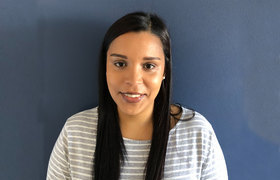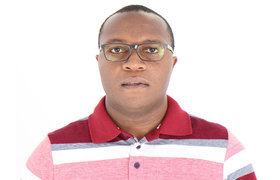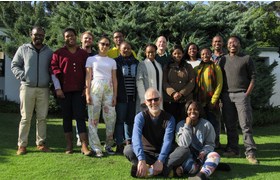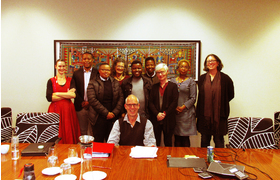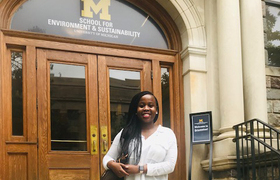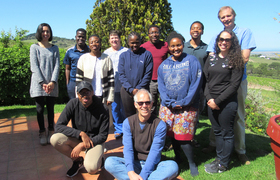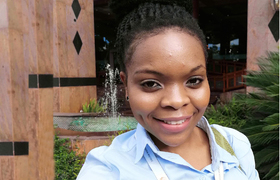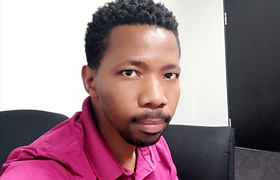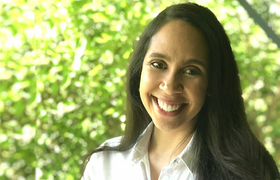Andiswa Mfengu: New nGAP associate
22 October 2019 | Story Andiswa Mfengu. Photo Provided. Read time 3 min.
I am a lecturer in the Department of Knowledge and Information Stewardship. Before joining the Faculty of Humanities at the beginning of 2019, I worked at UCT Libraries for a few years as a librarian for Commerce, and Science and Engineering.
I was born and bred in Cala in the Eastern Cape, the first born of five girls. Growing up in a small town I always dreamed of being a medical doctor because there were just so few and thus doctors were regarded as the gods. Growing up I was inspired by my mom who always said, “Andiswa, remember your little sisters are looking up to you.” Back then I thought this was unfair, but now I am grateful as it motivated me.
I did my primary and junior school in Cala Community School then went to St James, in Confimvaba, where I got my matric (they had one of the best matric results in the district). After I came to UCT, I did my undergraduate studies in molecular and cell biology (specialising in biochemistry and microbiology). In my final year I became aware that I preferred to work with people more than being in a laboratory, so I changed faculties and moved to humanities.
My journey in Library and Information Science (LIS) began with a postgraduate diploma, a master’s degree and currently I am pursuing my PhD in LIS. As a librarian I assisted researchers with funding and ad-hominem applications, which required researchers to show evidence of the impact that their research is making. I got a bit frustrated as a lot of the criteria focused on quantitative indicators (citations, h-index etc). These indicators are limited because they only focus on what is captured in international bibliographic indexers (Scopus, Web of Science, etc) and ignore the fact that the impact of research goes beyond the numbers.
My current research was a result of this frustration, so all is not lost as my PhD is looking at research impact assessment in higher education institutions. The study hopes to develop a holistic framework for assessing impact, one that looks at impact not only in the academy but also beyond – societal impact. As a UCT product I feel honoured to give back and to be part of the next generation.
It is my greater pleasure to be joining the ranks of the nGAP associates; I am looking forward to being part of this excellent community of practice.
“Not everybody can be famous, but everybody can be great, because greatness is determined by service.” – Martin Luther King Jr.
 This work is licensed under a Creative Commons Attribution-NoDerivatives 4.0 International License.
This work is licensed under a Creative Commons Attribution-NoDerivatives 4.0 International License.
Please view the republishing articles page for more information.
New Generation of Academics Programme (nGAP)
UCT has responded energetically to the New Generation of Academics Programme (nGAP), an opportunity provided by the Department of Higher Education (DHET) to build a new generation of black South African academics. The DHET’s 2015 vision document, “Staffing South Africa’s Universities Framework: A comprehensive, transformative approach to developing future generations of academics and building staff capacity”, proposes a suite of initiatives to address the challenge, with nGAP being the major instrument to increase the numbers of black South African academics.
The programme “involves the recruitment of highly capable scholars as new academics, against carefully designed and balanced equity considerations and in light of the disciplinary areas of greatest need”. The nGAP scholars are appointed into permanent positions where from the outset their conditions are customised to ensure their successful induction into the ranks of established academics.
The DHET provides funding over a six-year period to support the appointment of an nGAP lecturer, and their time is protected to provide the best possible opportunity for the completion of a doctorate degree in the shortest possible time. Once the degree is completed, the nGAP lecturer’s teaching commitments are steadily increased until they shoulder a full teaching load.
Since the first advertisement for nGAP posts in 2015, UCT has been awarded 17 nGAP positions: 5 (Phase 1), 4 (Phase 2), 3 (Phase 3) and 5 (Phase 4). These are distributed across all faculties.
UCT’s nGAP scholars operate as a single cohort, managed and coordinated by Dr Robert Morrell. Lecturers meet for quarterly meetings, writing retreats and various capacity-building activities all designed to support the completion of postgraduate qualifications (particularly doctorates) and to develop records of achievement that will testify to their emergence as self-standing, excellent academics. Each lecturer is mentored by a senior scholar, who provides support and guidance on the challenges that routinely face academics.
The nGAP manager sets great store in building the cohesion of the cohort and encouraging the establishment of new UCT networks while producing a collaborative, mutually supportive and embracing work culture.
According to Dr Morrell, “This group of academics will lead UCT in 15 to 20 years’ time ... Their vision of excellence, of being African and South African, of serving a wider community and producing knowledge for the planet, the continent and the country, will power UCT in years to come.”
Newsletters
In the news
